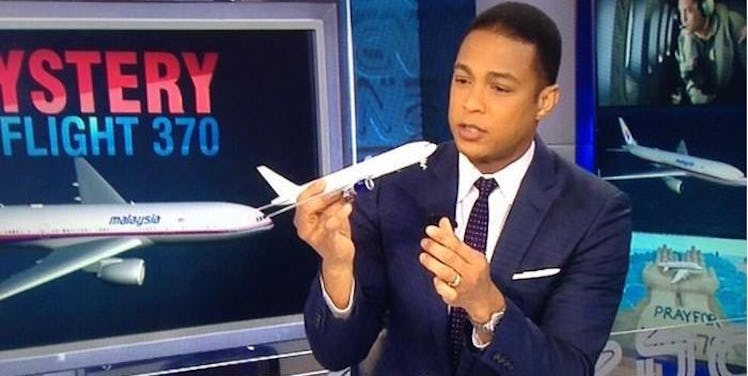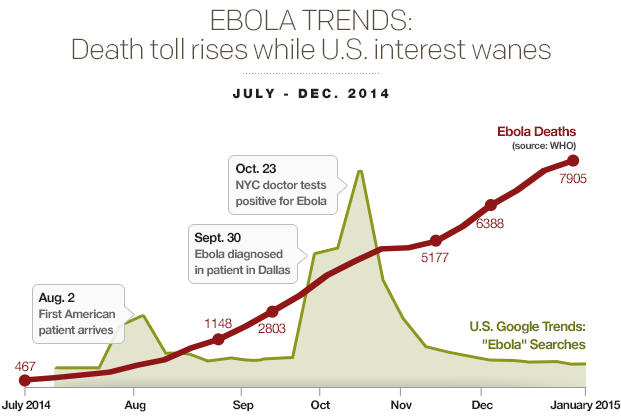
Why You Stop Giving A Sh*t About World Crises After 2 Weeks
At this very moment, people across the globe are suffering and dying from poverty, famine, disease and war.
In spite of numerous technological advances, it often feels as though civilization has regressed in the modern era. It's rare to wake up to good news these days; it's almost always filled with stories of violence, turmoil and chaos.
With recent headlines dominated by ISIS, Boko Haram, the Ukraine crisis, Charlie Hebdo and the Copenhagen shooting, it's easy to feel quite discouraged about the state of the world.
What's more, these are sadly only a small sample of the numerous crises currently occurring across the globe.
Correspondingly, at a DNC event a few months ago, President Obama stated:
If you watch the nightly news, it feels like the world is falling apart... And I can see why a lot of folks are troubled. The truth of the matter is, is that the world has always been messy. In part, we're just noticing now because of social media and our capacity to see in intimate detail the hardships that people are going through. And I promise you things are much less dangerous now than they were 20 years ago, 25 years ago or 30 years ago.
In many ways, President Obama is absolutely correct. It's an unfortunate fact that in the course of human history, violence has been a constant variable. The present day is no exception.
Simultaneously, however, humans are decidedly less violent today than they were in the past. We go to war less often, and violent conflicts kill fewer people than they used to.
We've also made great strides in terms of combatting poverty and disease. Accordingly, one might argue that we live in the greatest time in human history.
Yet, our increased awareness of the scale of global crises has served to increase the perception that "the world is a mess."
Much of this has to do with the rise of the 24/7 media cycle in conjunction with social media. At the same time, this is only a part of the equation.
We worry about the wrong things, but it's not always the media's fault.
Back in autumn, when Thomas Eric Duncan became the first individual diagnosed with Ebola in the United States, fear and panic spread like wildfire.
Many were quick to blame the media for this, arguing that various outlets' sensational reporting was spreading misinformation and unwarranted anxiety.
In truth, however, America's overreaction to Ebola was largely the fault of the public and its irrational reaction to an unfamiliar, albeit deadly, disease.
As Foreign Policy's Kalev Leetaru notes, the mainstream media's coverage of Ebola actually trended toward "emphasizing recovery than end-of-the-world panic."
If you compare this to the public's reaction on social media, however, there is a stark contrast.
In other words, at the height of Ebola paranoia in America, the mainstream media actually remained relatively calm. Even Fox News emerged as a voice of reason at one point.
The general public, however, temporarily lost its mind, spreading fear and misinformation across Facebook, Twitter and other platforms.
Many Americans completely misunderstood the level of risk that Ebola realistically posed to them, and why the focus should've been on the source of the outbreak.
Ebola has impacted West Africa most heavily, largely as a product of poor infrastructure, a lack of medical supplies and complicated political and cultural factors. Yet, it wasn't until Ebola arrived in America and Europe that the crisis received considerable attention.
As former UN Secretary General Kofi Annan stated during an interview with BBC Newsnight:
When you look at the evolution of the [Ebola] crisis, the international community really woke up when the disease got to America and Europe. And yet we should have known that in this interconnected world it was only a matter of time.
Ebola never posed a significant threat to the US, but it wouldn't have posed any danger whatsoever had major powers made stronger efforts to combat the disease prior to its arrival within their borders.
In essence, many international leaders waited for their own people to care about Ebola before they offered it substantive attention.
Foreign policy based off public opinion and awareness is often exceptionally misguided. After all, the American people don't really care about global affairs, they consistently express deeper concern for domestic matters.
Thus, they're probably not in the best position to offer guidance in this arena.
Americans are often far too quick to assume that they're immune from events occurring in faraway lands. Their subjective interpretation of the globe causes them to misinterpret the true nature of threats.
This narrow outlook is not only dangerous, it's also a large part of the reason media coverage is often sensational and inadequate.
Our short attention span is preventing us from understanding AND improving the world.
Regardless of the fact that Ebola has continued to affect West Africa, it didn't take long for America's hysteria surrounding it to subside.
As the chart below highlights, Ebola has continued to claim lives abroad into 2015, but Americans have stopped paying attention to it since, ostensibly, it's not directly impacting the US at the moment.
It also reveals that the peak of their concern came after it first arrived in their country:

In other words, America really only cared about this global crisis for about two weeks or so, and then it moved on.
Meanwhile, US troops sent to West Africa to help contain the spread of Ebola are being withdrawn, in spite of the fact that the epidemic isn't over. The US was late to respond to the outbreak, and now it's arguably leaving before the job is truly done.
This is all a product of the way in which crises are presented in the media, as well as America's short attention span.
It's fairly common for a new and shocking development to capture the public's attention, only to be old news within less than a month. This trend influences American policy, often for the worse.
In this interconnected world, ignorance is not an option.
Has the "if it bleeds it leads" philosophy ruined America's ability to see the world clearly? Or, contrarily, is the media simply responding to the American public's short attention span and perpetual desire for new stimuli?
In truth, it's a bit of both. Media companies are, first and foremost, businesses. They have to sustain viewership in order to remain profitable and alive. There is no certainly no shortage of stories out there, but the real question is, "Who will care?"
People want to be entertained, and much of the news is admittedly quite mundane, regardless of its importance.
This is why many outlets are driven toward sensationalism, sacrificing their integrity for the sake of a large audience.
Furthermore, as we've already noted, context and narrative play a large role in what Americans tend to pay attention to. This is why Charlie Hebdo got more attention than a Boko Haram massacre, for example.
America has far more cultural and historical connections with western Europe and France than it does it with Nigeria. Not to mention, as Ebola reveals, Africa isn't exactly a top priority for the United States.
This is not to say we should begin panicking about the prospect of a Boko Haram attack in the US. Rather, it's important we work toward establishing a more balanced approach to observing and responding to global affairs and developments. This is a good rule not only for the public, but also the media.
We can't only begin to care about and address issues the moment they appear to impact us. In this globalized and interconnected world, no one can afford to have this mindset.
This is not a case for interventionism, but informed and reasoned international cooperation. As Thomas Jefferson once stated:
No nation is permitted to live in ignorance with impunity.
It's time for us to relinquish this futile attachment to artificial borders, in order to come together and build a better world.
This will not happen overnight, but an informed populace is certainly a step in the right direction.
Citations: Dont Blame CNN For Ebola Panic (Foreign Policy), Ebola crisis WHO signals help for Africa to stop spread (BBC News), Remarks by the President at a DNC Event (White House), Shepard Smith Do Not Listen To The Hysterical Voices In The Media About Ebola (Huffington Post), Remember the Ebola epidemic Its still not over Heres the report from the ground (Vox), Ebola death toll rises in West Africa while Americans interest wanes (CBS News), Obama to Recall Military Personnel From Ebola Zone Officials Say (The New York Times), Voters still dont care about foreign policy (The Washington Post)